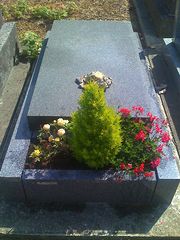Joseph Roth
Joseph Roth (September 2, 1894 in Brody - May 27, 1939 in Paris) was an Austrian novelist, best known for his family saga Radetzky March (1932), and for his novel of Jewish life, Job (1930).
Contents |
Habsburg empire
Roth grew up in Brody, a small town near Lviv in East-Galicia, part of the easternmost reaches of the Austro-Hungarian empire. Jewish culture played an important role in the life of the town.
After high school, Joseph Roth moved to Lviv to begin his university studies in 1913. Only one year later, he settled in Vienna to study philosophy and German literature at the local university. In 1916, Roth quit his university course and volunteered to serve in the Imperial Habsburg army fighting the First World War. This experience had a major and long-lasting influence on his life. So, too, did the collapse of the Habsburg Empire in 1918, which marked the beginning of a pronounced sense of 'homelessness' that was to feature regularly in his work.
Germany
In 1920 he moved to Berlin, where he worked as a highly successful journalist for the Neue Berliner Zeitung, then from 1921 for the Berliner Börsen-Courier. Later he became a features correspondent for the well-known liberal Frankfurter Zeitung, travelling widely throughout Europe. In 1925 he spent an influential period working in France and never again resided permanently in Berlin. In the late 1920s, his wife Friederike had become schizophrenic, which threw Roth into a deep crisis both emotionally and financially.
In 1923 Roth's first (unfinished) novel, The Spider's Web, was serialized in an Austrian newspaper and he achieved moderate success as a writer throughout the 1920s with a series of novels documenting life in post-War Europe. Only upon publication of Job and Radetzky March did he achieve real acclaim as a novelist.
From 1930, Roth's fiction became less concerned with contemporary society, with which he had become increasingly disillusioned, and during this period his work frequently evoked a melancholic nostalgia for life in imperial Central Europe prior to 1914. He often portrayed the fate of homeless wanderers looking for a place to live, in particular Jews and former citizens of the old Austria-Hungary, who, with the downfall of the monarchy, had lost their only possible Heimat or true home.
In his later works in particular, Roth appeared to wish that the monarchy could be restored in all its old glamour, even though at the start of his career he had written under the codename of "Red Joseph". His longing for a more tolerant past may be partly explained as a reaction against the nationalism of the time which finally culminated in National Socialism.
The novel The Radetzky March (1932) and the story Die Büste des Kaisers (The Bust of the Emperor) (1935) are typical of this late phase. In the novel The Emperor's Tomb Roth describes the fate, up until Germany's annexation of Austria in 1938, of a cousin of the hero of The Radetzky March. Of his works which deal with Judaism, the novel Job is the best-known.
Paris

On January 30, 1933, the day Adolf Hitler became Reich Chancellor, Roth, a prominent liberal Jewish journalist, left Germany. He would spend most of the next decade in Paris, a city he loved.
Shortly after Hitler's rise to power, in February 1933, Roth wrote in a prophetic letter to his friend, Austrian writer Stefan Zweig:
"You will have realized by now that we are drifting towards great catastrophes. Apart from the private - our literary and financial existence is destroyed - it all leads to a new war. I won't bet a penny on our lives. They have succeeded in establishing a reign of barbarity. Do not fool yourself. Hell reigns."[1]
From 1936 to 1938, he had a romantic relationship with Irmgard Keun. They worked together, traveling to various cities such as Paris, Wilna, Lemberg, Warsaw, Vienna, Salzburg, Brussels and Amsterdam.
Without intending to deny his Jewish origins, Roth considered his relationship to Catholicism very important, and in the final years of his life, he may even have converted; translator Michael Hofmann states in the preface to the collection of essays Report from a Parisian Paradise that Roth "was said to have had two funerals, one Jewish, one Catholic."
Despite suffering from chronic alcoholism, Roth remained prolific until his premature death in Paris in 1939. His final novella, The Legend of the Holy Drinker (1939), is amongst his finest, and chronicles the attempts made by an alcoholic vagrant to regain his dignity and honour a debt.
Joseph Roth is interred in the Thiais cemetery to the south of Paris.
Works
- Das Spinnennetz (The Spider's Web) (1923)
- Hotel Savoy (Hotel Savoy) (1924)
- Die Rebellion (The Rebellion) (1924)
- April. Die Geschichte einer Liebe (April: The History of a Love) (1925)
- Der blinde Spiegel (The Blind Mirror) (1925)
- Juden auf Wanderschaft (The Wandering Jews) (1927)
- Die Flucht ohne Ende (The Flight without End) (1927)
- Zipper und sein Vater (Zipper and His Father) (1928)
- Rechts und links (Right and Left) (1929)
- Der stumme Prophet (The Silent Prophet) (1929)
- Hiob (Job (novel)) (1930)
- Radetzkymarsch (The Radetzky March) (1932)
- Der Antichrist (The Antichrist) (1934)
- Tarabas (1934)
- Beichte eines Mörders (Confession of a Murderer) (1936)
- Das falsche Gewicht (Weights and Measures) (1937)
- Die Kapuzinergruft (The Emperor's Tomb) (1938)
- Die Legende vom heiligen Trinker (The Legend of the Holy Drinker) (1939)
- Die Geschichte von der 1002. Nacht (The String of Pearls) (1939)
- Der Leviathan (The Leviathan) (1940)
References
- ↑ 38. Hell reigns. - From a letter of Joseph Roth to Stefan Zweig, February 1933, page 70, Hitlers Machtergreifung - dtv dokumente, Edited by Josef & Ruth Becker, Deutscher Taschenbuch-Verlag, Second edition, Munich, Germany 1992, ISBN 3-423-02938-2
Bibliography
- Martin Mauthner: German Writers in French Exile, 1933-1940, Vallentine Mitchell, London, 2007(ISBN : 978 0 85303 540 4).
See also
- Exilliteratur